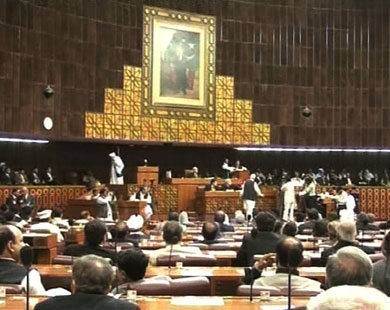Today, Saturday, the new ruling coalition in Pakistan tightened its grip on the Pakistani National Assembly (the lower chamber of Parliament) by electing a new speaker;
Thus, consolidating his control of the Legislative Council after the overthrow of Prime Minister Imran Khan in a no-confidence vote last Saturday.
The former Speaker and Vice President of the National Assembly, Khan's allies, had tried to stop and then postpone the vote until the Supreme Court ruled that their actions were against the law.
Ultimately, the National Assembly voted no-confidence against Khan last Sunday.
The new ruling coalition elected its candidate, Shahbaz Sharif, as the new prime minister.
The new Speaker of the National Assembly is Raja Pervez Ashraf, a former prime minister of the Pakistan People's Party participating in the new ruling coalition.
Ashraf was elected unopposed, in the absence of representatives from Khan's party, who submitted a collective resignation from the assembly last Monday.
"Raja Pervez Ashraf has been sworn in... as Speaker of the Pakistan National Assembly," said a Twitter account run by National Assembly staff.
The resignation of MPs from Khan's party would be considered, and if accepted, Pakistan would face the prospect of nearly 100 by-elections within two months, which would represent a major headache for Sharif and his partners in the new ruling coalition and an opportunity for Khan to rally popular support for him.
It is expected that Sharif will form his government in the coming days, and it will face a number of political challenges;
Especially when it comes to dealing with an economy that is in deep trouble.
Imran Khan, 69, who led Pakistan with a population of 220 million for three and a half years, accused Washington of supporting his overthrow because he visited Moscow, contrary to the desire of the United States, which denies the accusation.

